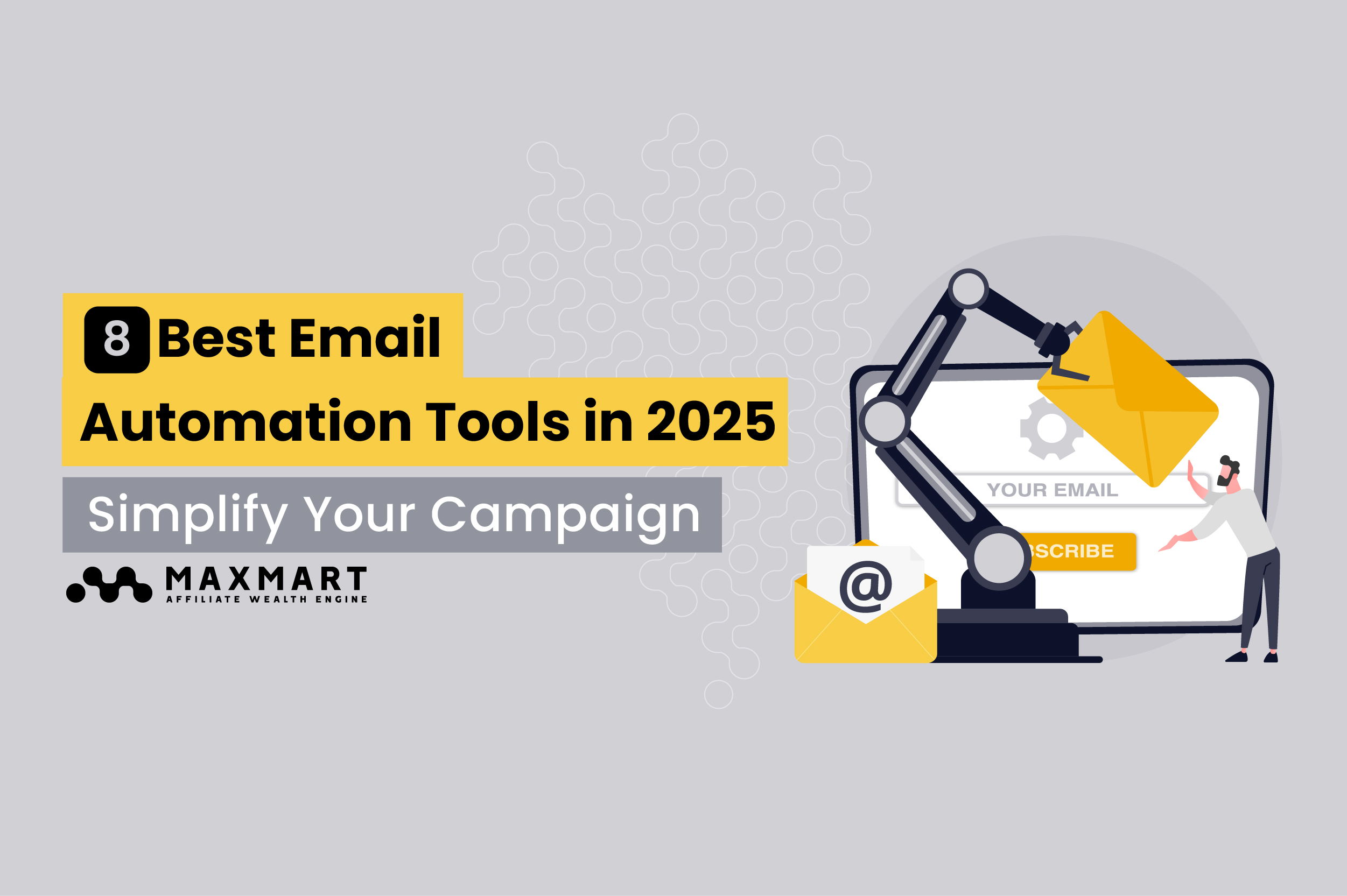Did you know that 81% of businesses rely on email as their primary communication channel with customers? In today’s fast-paced digital world, staying connected with your audience is more critical than ever, and email remains a top-performing marketing tool.
With the rise of advanced email automation tools, managing customer relationships, nurturing leads, and driving conversions has become faster and more efficient. These tools save time, reduce human error, and ensure consistent communication—key factors in building long-term trust and loyalty.
This blog is here to guide marketers, businesses, and startups in finding the best email marketing tools available in 2025. Whether you’re new to automation or looking to upgrade your strategy, this post will help you choose the right tools to streamline your email campaigns and achieve your goals.
Why Automated Email Marketing Is Essential in 2025
Email automation is no longer a luxury—it’s a necessity for staying competitive in today’s digital landscape. Let’s explore why:
- Trends in Email Marketing
- AI-driven personalization ensures every email feels tailor-made for the recipient.
- Data-driven insights help businesses craft smarter, more effective campaigns.
- Omnichannel integrations allow seamless communication across platforms like email, social media, and SMS.
- Challenges in Manual Email Management
- Inefficiency: Sending emails manually is time-consuming and error-prone.
- Lack of scalability: As your audience grows, manual processes can’t keep up.
- Missed opportunities: Without automation, personalization, and timely automated email responses become nearly impossible.
- Benefits of Email Automation Tools
- Boost ROI by delivering relevant content that converts.
- Enhance customer engagement with timely, personalized communication.
- Save valuable time by automating repetitive tasks, allowing you to focus on strategy.
Automated emails are a cornerstone of affiliate marketing strategy. You can find more as part of our learning center guide on the 5 Best Strategies to Drive Traffic for Affiliate Marketing in 2025
Key Features to Look for in Email Automation Tools
Choosing the right email automation tools can transform your marketing efforts. Here’s what to look for:
- Advanced Analytics and Reporting Capabilities
- Track open rates, click-through rates, and conversions with precision.
- Gain actionable insights to refine your campaigns for better performance.
- Seamless CRM and Third-Party Integrations
- Sync effortlessly with your customer relationship management software.
- Integrate with tools like e-commerce platforms, social media, and more for a unified approach.
- User-Friendly Design with Drag-and-Drop Builders
- Simplify email creation with intuitive drag-and-drop interfaces.
- Enable non-technical users to design professional campaigns effortlessly.
- Scalability for Businesses of All Sizes
- Ensure the tool can grow with your business, from startups to enterprises.
- Handle increasing subscriber lists and more complex workflows with ease.
You can also get a better general grasp on affiliate marketing in general, by delving in to our learning post on Affiliate Marketing 2025: A Step-by-Step Guide to Building Passive Income
The Top 8 Email Automation Tools in 2025: Automate your Email Marketing Campaigns for Increased Yield
Now that we’ve covered why email automation tools are essential and the key features to look for, it’s time to dive into the top tools available in 2025. Eachof these best email automation platform candidates offer unique strengths to help you streamline your email campaigns and boost results.
1. Klaviyo
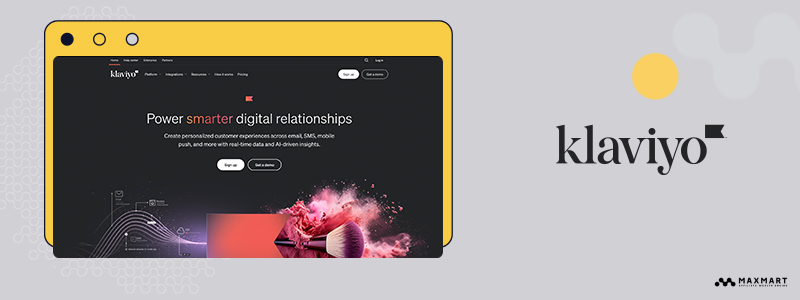
Klaviyo is a leading email automation software designed specifically for e-commerce businesses. It excels at helping brands build personalized relationships with their customers through data-driven email campaigns. Klaviyo integrates seamlessly with popular e-commerce platforms like Shopify, WooCommerce, and BigCommerce, making it an excellent choice for online stores looking to scale their email marketing efforts.
With robust segmentation capabilities, Klaviyo allows you to target customers based on purchase behavior, website activity, and other data points. Its AI-driven insights empower businesses to create campaigns that resonate with their audience, resulting in higher engagement and conversions.
Pros
- E-commerce Focus: Klaviyo’s deep integration with e-commerce platforms allows you to automate abandoned cart reminders, product recommendations, and post-purchase follow-ups with ease.
- Advanced Segmentation: Segment customers using precise filters, such as spending habits or browsing history, for hyper-targeted campaigns.
- Easy-to-Use Templates: Pre-built email templates and a drag-and-drop editor simplify the design process for beginners.
- Actionable Insights: Detailed analytics provide a clear view of performance, enabling data-driven decisions to improve ROI.
Cons
- Price Scaling: As your subscriber list grows, Klaviyo’s pricing can become expensive, making it less ideal for smaller businesses on a tight budget.
- Learning Curve: While user-friendly, its advanced features may require some time for new users to master.
Pricing
- Free Plan: Up to 500 contacts and 5,000 monthly emails.
- Paid Plans: Start at $20/month for 500 contacts, scaling with the size of your audience.
- Enterprise Plans: Custom pricing for businesses with larger subscriber bases or advanced needs.
Verdict
Klaviyo is an excellent email automation tool for e-commerce brands aiming to leverage customer data for personalized, high-impact campaigns. While its pricing may be steep for smaller businesses, its powerful features, seamless integrations, and data-driven insights make it a top choice for scaling e-commerce operations. For businesses prioritizing personalization and ROI, Klaviyo stands out as a reliable investment.
2. ActiveCampaign
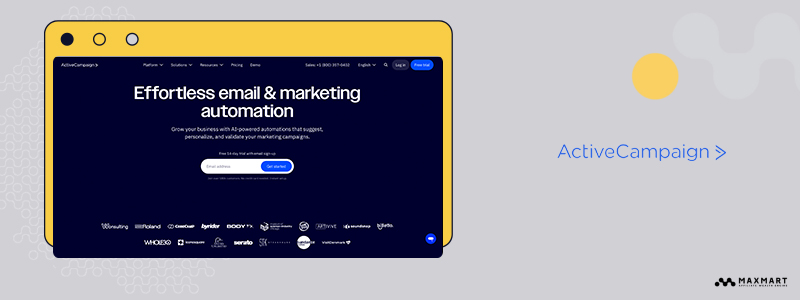
ActiveCampaign is a robust email automation tool that combines email marketing, CRM capabilities, and marketing automation into a single platform. Designed to serve businesses of all sizes, it’s particularly popular among small and medium-sized companies looking to streamline their communication and improve customer relationships.
What sets ActiveCampaign apart is its advanced automation builder, allowing businesses to create detailed workflows tailored to customer journeys. With over 850 integrations, including popular platforms like Salesforce, Shopify, and WordPress, it fits seamlessly into most tech stacks.
Pros
- Comprehensive Automation: Its drag-and-drop automation builder is one of the most intuitive and feature-rich on the market, enabling businesses to create workflows for email sequences, lead scoring, and more.
- Built-In CRM: ActiveCampaign integrates a customer relationship management (CRM) system to help businesses manage and nurture leads in one place.
- Segmentation and Personalization: Offers advanced segmentation options, ensuring highly targeted email campaigns based on user behavior and preferences.
- A/B Testing: Optimize campaigns with A/B testing for subject lines, content, and call-to-actions to drive better results.
Cons
- Complexity for Beginners: The extensive features can feel overwhelming for new users or those without prior automation experience.
- Limited Free Email Automation Plan: Unlike some competitors, ActiveCampaign does not offer a free plan, which may deter smaller businesses.
Pricing
- Lite Plan: Starts at $29/month for 1,000 contacts.
- Plus Plan: $49/month for 1,000 contacts, with added features like CRM and lead scoring.
- Professional Plan: $149/month for 1,000 contacts, including predictive sending and customer journey mapping.
- Enterprise Plan: Custom pricing for larger businesses with advanced needs.
Verdict
ActiveCampaign is a highly versatile email automation tool that balances email marketing with CRM functionality, making it a one-stop solution for businesses focused on growth. Its advanced automation capabilities and integrations are ideal for businesses ready to level up their marketing efforts. While the lack of a free plan may be a drawback, its feature set justifies the cost for those who need a sophisticated, scalable solution.
3. Brevo (formerly Sendinblue)
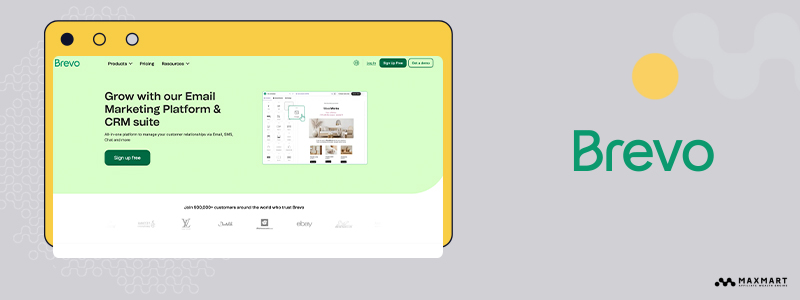
Formerly known as Sendinblue, Brevo is an all-in-one email workflow automation tool designed for businesses seeking an easy-to-use platform with robust features. It caters to a wide audience, from small startups to mid-sized businesses, offering solutions for email marketing, SMS campaigns, and CRM.
Brevo’s simplicity and affordability make it a popular choice for businesses new to email automation. It provides tools for email design, audience segmentation, and analytics, as well as unique features like transactional email support and chat integrations. Its flexibility ensures it can adapt to both marketing and transactional needs.
Pros
- Budget-Friendly: Brevo offers affordable pricing plans and a generous free tier, making it accessible to smaller businesses.
- Transactional Emails: Ideal for businesses needing to send order confirmations, password resets, or other transactional communications.
- Multi-Channel Capabilities: Manage email, SMS, and even website chat interactions in one place.
- Easy-to-Use Interface: A simple design and drag-and-drop editor make it approachable for non-technical users.
Cons
- Limited Advanced Features: Compared to higher-end competitors, Brevo lacks some of the more sophisticated automation and analytics options.
- Scaling Challenges: While great for small businesses, larger enterprises may outgrow its feature set.
Pricing
- Free Plan: Includes 300 emails/day and unlimited contacts.
- Starter Plan: Starts at $25/month for 20,000 emails, with no daily sending limit.
- Business Plan: $65/month, adding advanced analytics, A/B testing, and automation workflows.
- Enterprise Plan: Custom pricing with dedicated support and advanced features for high-volume needs.
Verdict
Brevo is an excellent email automation tool for small to mid-sized businesses seeking a cost-effective, user-friendly platform. Its ability to handle transactional emails alongside traditional marketing campaigns gives it a unique edge. While it may not meet the needs of enterprises requiring advanced features, it remains a solid option for businesses prioritizing simplicity, affordability, and multi-channel communication.
4. HubSpot Marketing Hub
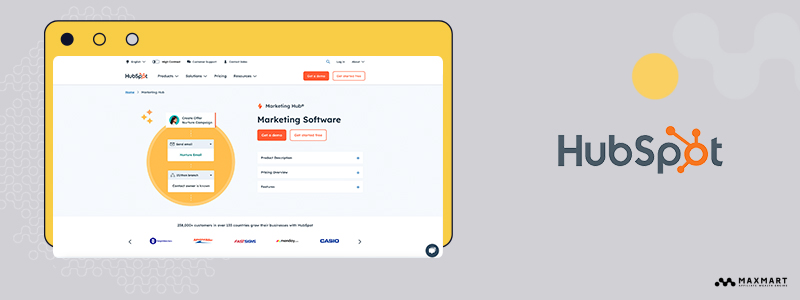
HubSpot Marketing Hub is an all-encompassing email automation tool tailored for businesses that want to integrate their email marketing with broader inbound marketing strategies. As part of the HubSpot ecosystem, it connects seamlessly with HubSpot CRM, enabling a unified view of customer interactions.
What makes HubSpot Marketing Hub stand out is its ability to align email automation with content marketing, lead nurturing, and customer engagement. From creating personalized email campaigns to building complex workflows, it offers tools that cater to businesses aiming to scale and optimize their marketing efforts.
Pros
- All-in-One Platform: Combines email marketing, lead generation, social media management, and analytics in one place.
- Seamless CRM Integration: Native connection with HubSpot CRM ensures a streamlined workflow between sales and marketing teams.
- Personalization at Scale: Use dynamic content and segmentation to deliver tailored experiences for each recipient.
- Comprehensive Analytics: Track open rates, click-throughs, and conversion metrics alongside broader marketing insights.
- Free CRM: Businesses can use HubSpot’s free CRM to enhance email marketing efforts at no extra cost.
Cons
- Price: HubSpot’s advanced features come with a high price tag, which can be a barrier for smaller businesses.
- Learning Curve: Its vast feature set can feel overwhelming for new users.
- Customization Limitations: While robust, some users find limitations in custom workflows compared to specialized automation tools.
Pricing
- Free Plan: Includes basic email marketing and CRM tools.
- Starter Plan: $45/month for email marketing, landing pages, and simple automation for up to 1,000 contacts.
- Professional Plan: $800/month, with advanced automation, A/B testing, and in-depth analytics.
- Enterprise Plan: $3,600/month for enterprise-grade features, including predictive analytics and advanced reporting.
Verdict
HubSpot Marketing Hub is an exceptional email automation tool for businesses seeking a holistic marketing solution. Its integration with the HubSpot ecosystem makes it a powerful choice for aligning email campaigns with broader inbound strategies. While its pricing may deter smaller businesses, the comprehensive feature set and scalability make it a worthy investment for companies aiming to grow and optimize their marketing efforts across channels.
5. Mailchimp
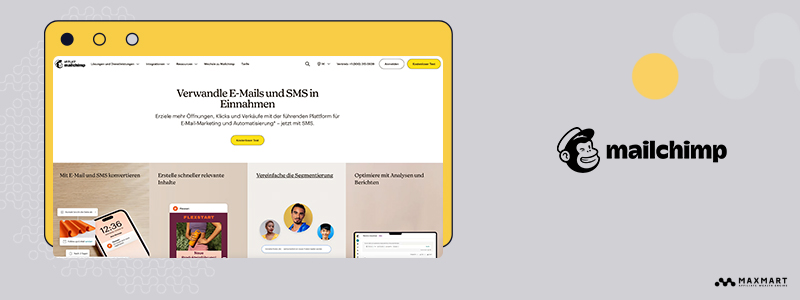
Mailchimp is one of the most widely recognized email automation tools, catering to a broad spectrum of users—from beginners to seasoned marketers. Known for its intuitive interface, Mailchimp offers a range of features including email campaign creation, audience segmentation, analytics, and basic CRM functionality.
Its versatility makes it a great option for small businesses, freelancers, and even larger organizations looking for an easy-to-use email marketing solution. Mailchimp’s library of pre-designed templates and automation workflows simplifies campaign management, while its integrations with platforms like Shopify, WordPress, and Salesforce enhance its flexibility.
Pros
- Ease of Use: Intuitive design, drag-and-drop email editor, and pre-built workflows make it beginner-friendly.
- Free Plan: A generous free tier allows small businesses to get started without upfront costs.
- All-in-One Features: Includes email marketing, social posting, landing pages, and even basic CRM tools.
- Extensive Integration Options: Works well with e-commerce platforms, content management systems, and analytics tools.
- Creative Tools: Offers built-in features like a content studio, creative assistant, and predictive insights for better email design and targeting.
Cons
- Pricing for Advanced Features: As you scale, advanced features like behavioral targeting and in-depth analytics require more expensive plans.
- Automation Limitations: While suitable for simple workflows, its automation features are less advanced compared to competitors like ActiveCampaign.
- Customer Support: Limited support on the free plan may frustrate users needing quick assistance.
Pricing
- Free Plan: Includes 500 contacts and up to 1,000 monthly email sends.
- Essentials Plan: Starts at $13/month for up to 500 contacts, with access to additional templates and A/B testing.
- Standard Plan: $20/month for advanced audience insights and automation features.
- Premium Plan: $350/month for advanced segmentation, multivariate testing, and priority support.
Verdict
Mailchimp remains a popular email automation tool for businesses of all sizes, thanks to its ease of use and versatility. While it’s ideal for small businesses starting their email marketing journey, its scalability and robust integrations also cater to more advanced needs. However, users looking for highly sophisticated automation or more affordable pricing at scale might find alternatives like Klaviyo or ActiveCampaign more suitable. For straightforward, accessible email marketing, Mailchimp is hard to beat.
6. Omnisend

Omnisend is a highly focused automated email system designed to meet the unique needs of e-commerce businesses. It integrates seamlessly with platforms like Shopify, WooCommerce, and BigCommerce, making it a go-to choice for online stores aiming to streamline their customer communication across email, SMS, and other channels.
Omnisend excels in creating multi-channel campaigns, combining emails with SMS, push notifications, and more in a single workflow. With its pre-built e-commerce workflows—such as abandoned cart recovery, product recommendations, and order confirmations—it empowers businesses to deliver personalized and timely messages that drive sales.
Pros
- Multi-Channel Capabilities: Easily combine email with SMS, push notifications, and even Facebook Messenger for cohesive marketing.
- E-Commerce Integration: Tailored for online stores, with pre-built workflows designed to boost sales and retention.
- Intuitive Automation: Drag-and-drop workflow builder simplifies the creation of detailed, multi-channel automation.
- Advanced Segmentation: Target customers with precision based on shopping behavior, lifecycle stage, and other e-commerce data.
- Performance Tracking: Clear, actionable analytics make it easy to measure the ROI of each campaign.
Cons
- Limited Non-E-Commerce Features: While excellent for online retailers, it may not cater well to businesses outside the e-commerce niche.
- Pricing on SMS Campaigns: SMS costs can add up quickly, especially for businesses with large subscriber lists.
- Learning Curve for Multi-Channel: Multi-channel workflows may take some time to master for those new to automation.
Pricing
- Free Plan: Includes 500 emails/month and 250 contacts.
- Standard Plan: Starts at $16/month for up to 500 contacts, with additional emails and basic automation workflows.
- Pro Plan: $59/month for 500 contacts, advanced reporting, and SMS credits.
- Enterprise Plan: Custom pricing for high-volume needs with priority support and dedicated account management.
Verdict
Omnisend is a top-tier email automation tool for e-commerce businesses, offering specialized features like multi-channel campaigns and deep e-commerce integrations. While it may not be ideal for non-e-commerce industries, its ability to boost sales with personalized, targeted messaging makes it a standout choice for online retailers. For businesses seeking a focused, high-impact automation solution, Omnisend delivers exceptional value and performance.
7. Drip
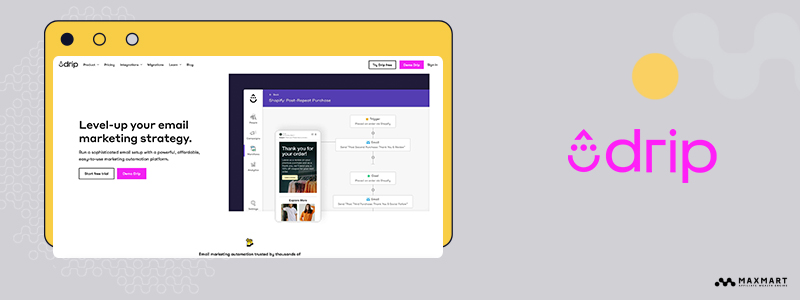
Drip is a dynamic email automation tool tailored to the needs of e-commerce businesses and direct-to-consumer brands. It focuses on building meaningful customer relationships through personalized, data-driven email campaigns. With its ability to integrate deeply with e-commerce platforms like Shopify, WooCommerce, and Magento, Drip enables businesses to create campaigns that resonate with their audience at every stage of the customer journey.
Drip’s standout features include advanced segmentation, multi-channel automation, and real-time tracking of customer interactions. Its intuitive interface allows marketers to set up complex workflows with ease, while its analytics provide clear insights into campaign performance.
Pros
- Personalized Campaigns: Leverages real-time data to send tailored messages based on user behavior, purchase history, and lifecycle stage.
- Deep E-Commerce Integrations: Connects seamlessly with major e-commerce platforms, helping businesses automate processes like abandoned cart emails, product recommendations, and post-purchase follow-ups.
- Multi-Channel Marketing: Combines email, SMS, and other touchpoints into a unified customer journey.
- Actionable Analytics: Provides detailed reports on campaign performance, making it easy to optimize marketing strategies.
- Scalability: Suitable for businesses of all sizes, from startups to enterprise-level brands.
Cons
- Price: Drip’s pricing can escalate quickly as your subscriber list grows, making it less accessible for small businesses with limited budgets.
- Limited Templates: Compared to competitors like Mailchimp, Drip offers fewer pre-designed templates for email creation.
- Learning Curve: Its advanced features may require time for new users to fully understand and implement effectively.
Pricing
- Starter Plan: $39/month for up to 2,500 contacts, including unlimited email sends.
- Custom Plans: Scales based on contact list size, with pricing adjusted as your audience grows.
- Free Trial: Offers a 14-day free trial to explore its features before committing.
Verdict
Drip is a highly effective email automation tool for e-commerce businesses that prioritize personalized, data-driven campaigns. Its deep integration with e-commerce platforms and multi-channel capabilities make it a powerful choice for brands looking to enhance customer engagement and drive conversions. While its pricing may pose a challenge for smaller businesses, Drip’s robust features and scalability justify the cost for those seeking a high-impact, long-term solution.
8. MailerLite
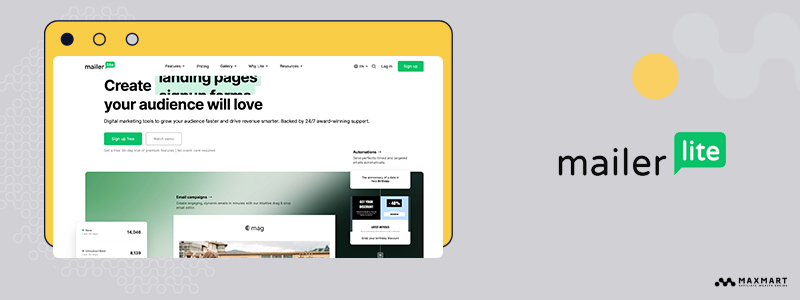
MailerLite is a lightweight yet powerful email automation tool designed for small businesses, bloggers, and startups. Known for its clean interface and affordable pricing, it offers a range of essential features, from email design and automation workflows to audience segmentation and analytics.
MailerLite stands out for its simplicity, making it ideal for beginners. Despite its minimalist approach, it doesn’t compromise on functionality. It provides tools like landing page creation, A/B testing, and integration with platforms like WordPress, Shopify, and Zapier, allowing businesses to manage their campaigns efficiently without being overwhelmed.
Pros
- Ease of Use: Intuitive drag-and-drop editor and straightforward navigation make it beginner-friendly.
- Affordable Pricing: Offers a generous free plan and affordable paid options for businesses on a budget.
- All-in-One Features: Includes email automation, landing page creation, and pop-up builders in one package.
- Customization: Provides responsive templates and flexible design options for personalized emails.
- Scalability: Works well for growing businesses with automation and list management features that evolve with your needs.
Cons
- Basic Automation: While sufficient for simple workflows, it lacks the advanced capabilities of tools like ActiveCampaign or HubSpot.
- Limited Integrations: Fewer integration options compared to competitors, which might be a drawback for businesses with complex tech stacks.
- Support Restrictions: Customer support on the free plan is limited to email assistance only.
Pricing
- Free Plan: Includes up to 1,000 subscribers and 12,000 monthly emails.
- Growing Business Plan: Starts at $10/month for unlimited emails and additional features like templates, analytics, and A/B testing.
- Advanced Plan: $19/month, with advanced automation, priority support, and additional customization tools.
- Enterprise Plan: Custom pricing for high-volume needs and premium support.
Verdict
MailerLite is an excellent email automation tool for small businesses and individuals seeking simplicity and affordability. Its user-friendly interface and essential automation features make it a perfect starting point for beginners, while its scalability ensures it can grow alongside your business.
However, for advanced automation or deeper integration capabilities, more robust tools like Drip or ActiveCampaign may be better suited. For those prioritizing ease of use and cost-effectiveness, MailerLite is a strong contender.
Conclusion
Email automation is a game-changer for businesses in 2025. It saves time, enhances personalization, and delivers measurable results. From email automation platforms tailored to e-commerce like Klaviyo and Omnisend to versatile platforms like Mailchimp and ActiveCampaign, the right email automation tool can transform your marketing strategy. By focusing on your specific needs—whether it’s budget, advanced automation, or scalability—you can find the perfect fit for your business.
Many of the tools reviewed, such as Drip, HubSpot Marketing Hub, and MailerLite, offer free trials or demos, making it easier to test their features and find the one that aligns with your goals. We encourage you to explore these options to see which works best for building meaningful customer relationships and achieving your objectives.
At MaxMart, we’re committed to helping businesses establish a strong online presence and drive meaningful traffic. Beyond this guide on email automation tools, we provide in-depth reviews and resources on a range of essential digital tools, including domain tools, website tools, SEO tools, YouTube tools, Instagram tools, and more. Our aim is to equip you with the insights you need to grow your business and thrive in the digital age.

